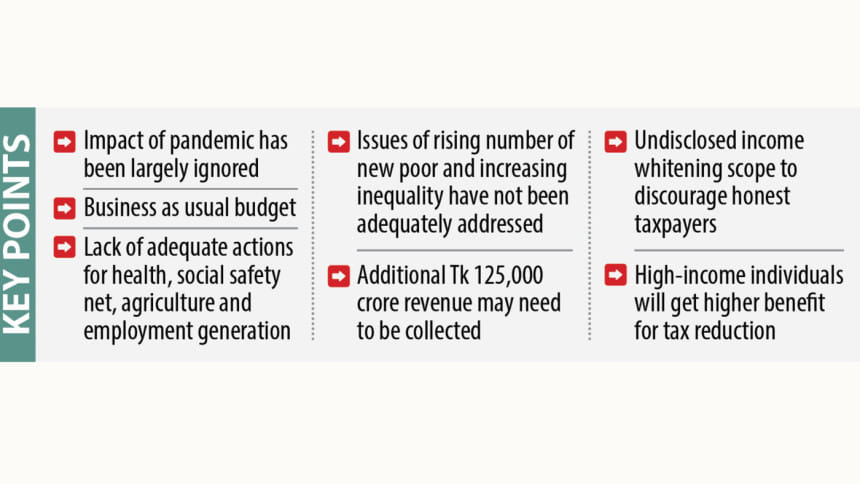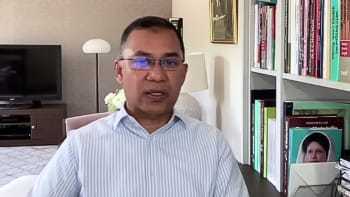Economic targets not realistic: CPD

The government has forgotten about the ongoing pandemic and subsequently failed to be innovative enough to frame fiscal measures to take the economy on to the path of recovery, said the Centre for Policy Dialogue (CPD) yesterday.
The independent think-tank said economic targets -- GDP growth, private investment and revenue collection -- set for the next fiscal year do not reflect the ground reality.
Sectors that warrant the highest priority to tackle the growing health emergency have not received due attention.
"COVID-19 induced health, economic, humanitarian and social crises are unprecedented, and the budget for fiscal 2020-21 needed to be more innovative to address this multidimensional crisis," said CPD Executive Director Fahmida Khatun at a virtual media briefing.
The civil society body organised the briefing to share its analysis on the proposed Tk 568,000 crore-budget for fiscal 2020-21, which is an increase of 9 percent from the original budget of the outgoing fiscal year.
The government aims to collect 67 percent, or Tk 378,000 crore of its total expenditure plans, from revenue collection.
And the National Board of Revenue (NBR) would be required to collect 87 percent of the revenue. The tax collector is far away from achieving its revised collection goal of Tk 300,500 crore for the current fiscal.
Until April, the NBR collected only Tk 175,000 crore during the July-April period of the current fiscal year as revenue declined for the COVID-19-induced shutdown.
The CPD said the overall revenue collection, including the NBR's collection, would be nearly Tk 253,000 crore by the end of this fiscal year.
And the NBR and the other government agencies would require the collection of an additional Tk 125,000 crore the next fiscal year to achieve the goal of gathering a total of Tk 378,000 crore in revenue -- an impossible feat.
So, there will be pressure on the banking sector to finance the deficit as the government aims to borrow 79 percent higher from the banking sector in the next fiscal year.
The CPD said the economy was under pressure and COVID-19 has aggravated the performance of the economy and a number of its indicators -- negative export and import growth -- show worrying signals.
Against this backdrop, the government has set the target of 8.2 percent GDP growth the next fiscal year, envisaging a 'V-shaped' recovery of the economy.
"However, the underlying trends of private investment, productivity, private sector credit, export, import and remittances pose serious questions as regards the predicted recovery path," Fahmida said.
The CPD's reactions came as an increasing number of people is reported to be corornavirus-positive and the number of deceased is growing every day and the curve is showing no sign of flattening.
"We are in health crisis but we have no plans to flatten the curve and on how we will battle the crisis," said CPD Distinguished Fellow Mustafizur Rahman.
The CPD said it had urged to give priority to health, social safety net, agriculture and employment generation in its budget recommendations and the government has rightly emphasized these sectors.
"However, its promises and priorities have not been translated into actions through innovative approaches and the allocation of adequate resources."
The CPD said allocation transport, physical planning, water supply & housing, power education and religious affairs as well as science, information & communication technology increased in the annual development programme (ADP).
"Priority sectors in view of COVID-19 have not received due attention. Surprisingly, the share of health, nutrition, population and family welfare in the ADP for fiscal 2020-21 remained the same as in fiscal 2019-20 despite this being the most important sector given COVID-19."
The agency said risk mitigation and economic recovery in the backdrop of COVID-19 should have been the twin overarching objectives of next fiscal year's budget.
It said the COVID-19 situation is an evolving one; there are significant uncertainties regarding its duration and the extent of the impact.
Yet, the government has framed the budget on the assumption that the fallout from COVID-19 would be managed in a very short period and the economy will bounce back the next fiscal year.
Private investment has been estimated to be 25.3 percent of GDP in fiscal 2020-21, which is a 12.6 percentage point increase from the finance ministry's estimate of private investment for fiscal 2019-20.
The think-tank said the government should have tried to get out of the GDP growth-centric philosophy and have focused more on poverty, inequality and employment to save lives and livelihoods to come out of the national emergency.
"But the issue of growth came time and again," said Fahmida, adding that the main objective should be supporting the poor and affected people, instead of being much too concerned with GDP growth during a crisis such as the pandemic.
The focus should be on coping, adjustment and mitigation to subsequently get on the recovery track, it said, adding that the rising number of new poor and the increasing income and consumption inequality require differentiated measures that the budget has not adequately addressed.
Analysing tax measures, the CPD said the lowest segment of income earners, whose monthly income is between Tk 30,000 and Tk 60,000, will gain the most -- from 28 percent to 67 percent -- for the change in tax measures.
However, the benefit will start to increase again for monthly income earners of Tk 4 lakh and above, so it is not promoting tax justice, it added.
Tax measures will also benefit individuals who earn a very high level of income, said CPD Senior Research Fellow Towfiqul Islam Khan.
The think-tank also criticised the scope to legalise undisclosed money, saying it discourages honest taxpayers and undermine the cause of transparency and good governance.
CPD Research Director Khondaker Golam Moazzem also spoke among others.

 For all latest news, follow The Daily Star's Google News channel.
For all latest news, follow The Daily Star's Google News channel. 



Comments